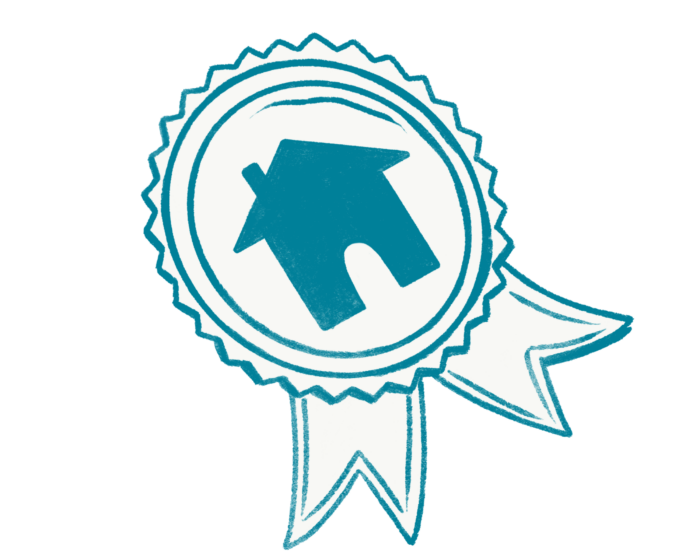Naturally, you want your home’s value to increase. A lot, if possible! Then you have shelter and a healthy long-term savings account rolled into one. That’s some nice peace of mind. How does home equity work, and how do you build it?
Your equity, simply put, is the amount of your home that you actually own. To roughly calculate your equity, just subtract what you owe on the house from your best estimate of the current market value.
When you first buy your home, your down payment is all the equity you have (unless you somehow managed to snag the house for less than the true market value, which is not likely these days). If your equity is going to grow, the debt has to go down, and/or the property value has to go up.
There are five ways to accomplish that. We call them the five pillars of home equity. If you get lucky with the one you can’t control and apply some good habits and smart moves to the four that you can, your equity will grow.
1. Appreciation
Appreciation is probably the first thing you think of when you think “equity.” It’s an increase in value over time, due to a rising market. You don’t have to do anything to earn it — but you have no control over it either.
When you buy at the right time, in the right place, it’s like getting in on a hot stock early. You just sit back and watch your equity go up and up. Nice! Recently, that’s been the reality for many homeowners. Nationally in 2017, the average increase in value was $15,000. But that’s an average. Values didn’t budge in Louisiana, while in California, where prices are bonkers to begin with, the average increase was $44,000.
Just keep in mind that appreciation is never a sure thing over the long term. It might be hard to believe in these days of housing shortages and bidding wars, but like stock prices, home prices can fall. And fall far. It’s been a decade since the housing bubble burst, and millions of homeowners coast to coast are still underwater on their mortgages. Now that hurts.
However, appreciation is just one thing that builds equity. Read on.
2. Monthly payments
Simply making your monthly payments slowly builds equity. In fact, mortgage payments are sometimes referred to as forced savings. A lot of people tend to neglect saving for emergencies or for retirement — something always seems to get in the way — but miss a mortgage payment? Never.
When you first buy your home, much of your monthly payment goes toward interest. With each passing month, a little more goes toward principal, and you come to own a larger and larger percentage of your home.
3. Extra payments on principal
How can you build equity faster? Simple: make extra payments on principal. Like we said above, when you first buy your home, much of your monthly payment goes toward interest, so you’re not building equity very fast. If you pay extra toward principal on a regular basis, you’ll build equity faster — and pay off your loan sooner.
There’s an even bigger bonus to extra payments on principal, especially when you make them in the early years of homeownership: you reduce the total interest you’ll pay over the life of the loan.
How? Every time you make a payment on principal, you eliminate all the interest you would have paid on that amount. It’s an investment with a guaranteed payback. Even an extra $100 a month, paid consistently over the years, can save you tens of thousands of dollars in interest. And it’s not that hard to find an extra $100 a month hiding in your everyday spending.
Make sure your extra payments do go to principal — check your monthly mortgage statement. If your loan servicer hasn’t provided a clear way to indicate how you want extra payments to be applied, get in touch with them first.
Easy ways to make extra payments on principal:
- Add one twelfth of a payment to each monthly payment, and by the end of the year, you’ll have made 13 payments instead of 12
- Schedule a separate, automated payment of $100 or $200 to be made each month
- Do less frequent, larger chunks: put part or all of your annual tax refund or holiday bonus toward an extra payment
- Try EarnUp, a loan payment platform that automates all your loan payments and helps you make the most of your payments on principal
4. Good home maintenance
Maintenance is partly about maintaining the market value of your home. If you let things slide, it can cost you. Who wants to buy into peeling paint, or a moldy basement, or a jungly, overgrown yard? Regular maintenance can also save you money by uncovering issues before they evolve into expensive problems.
But really good maintenance can also increase your home’s value. Just think about your own reaction, as a homebuyer, to those really spotless houses. You’re more willing to pay top dollar, right?
For a lot of us, the main barrier to good home maintenance is that we’re hopelessly busy. It’s so easy to fall behind even on the small tasks, or to just plain forget about them. (Raise your hand if you can’t even remember to change your smoke alarm batteries every year.) Our downloadable home maintenance checklist might help.
5. Home improvements
The fifth way to build equity is to put money into your house in the form of improvements that increase its market value.
“Increase its market value” is the key phrase. Not all renovations, upgrades, and additions are created equal. Projects that appeal to you and even enhance your life might not do much for future buyers.
So, what home improvements reliably build equity? Here are your best bets:
- Creating curb appeal
- A new roof
- Installing or refinishing hardwood floors
- Upgrading insulation
- New siding
- Adding, enlarging, or improving outdoor living spaces
- A kitchen upgrade
- A larger bathroom
- A second bathroom, if you have only one
- New windows




